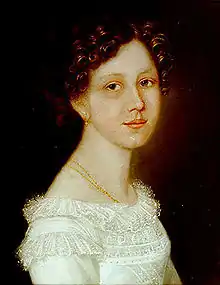Marienbad Elegy
The "Marienbad Elegy" is a poem by Johann Wolfgang von Goethe. It is named after the spa town of Marienbad (now Mariánské Lázně) where Goethe, 73 years old, spent the summer of 1821. There he fell in love with the 17-year-old Ulrike von Levetzow. Goethe returned to Marienbad in the summer of 1823 to celebrate his birthday. On that occasion, he asked Ulrike, via his friend, Karl August, Grand Duke of Saxe-Weimar-Eisenach, to marry him. She declined.
Analysis

This poem, considered one of Goethe's finest and most personal,[1][2][3] reflects the devastating sadness the poet felt when his proposal for marriage was declined. He started writing the poem on 5 September 1823 in a coach which carried him from Eger (now Cheb) to Weimar and by his arrival on 12 September, it was finished. He showed it only to his closest friends.[4]
Mir ist das All, ich bin mir selbst verloren,
Der ich noch erst den Göttern Liebling war;
Sie prüften mich, verliehen mir Pandoren,
So reich an Gütern, reicher an Gefahr;
Sie drängten mich zum gabeseligen Munde,
Sie trennen mich, und richten mich zugrunde.
To me is all, I to myself am lost,
Who the immortals' fav'rite erst was thought;
They, tempting, sent Pandoras to my cost,
So rich in wealth, with danger far more fraught;
They urged me to those lips, with rapture crown'd,
Deserted me, and hurl'd me to the ground.[5]
Goethe never returned to Bohemia. He died in Weimar in 1832.
References
- Liukkonen, Petri. "Goethe". Books and Writers (kirjasto.sci.fi). Finland: Kuusankoski Public Library. Archived from the original on 6 August 2008.
- Johann Wolfgang von Goethe, Stanley (1999). 103 Great Poems: A Dual-language Book. Translated by Appelbaum. Courier Corporation. p. xxiv. ISBN 0486406679.
'Marienbad Elegy' [...] has been called Goethe's greatest poem.
- Goethe Archived 2008-08-07 at the Wayback Machine
- Goethe's third summer, in Czech Archived 2012-06-30 at Archive.today ("Ulrika von Levetzowová" (in Czech) may be a replacement)
- "Marienbad Elegy", final stanza, translated by Edgar Alfred Bowring
External links
| Wikisource has original text related to this article: |
| German Wikisource has original text related to this article: |
.jpg.webp)